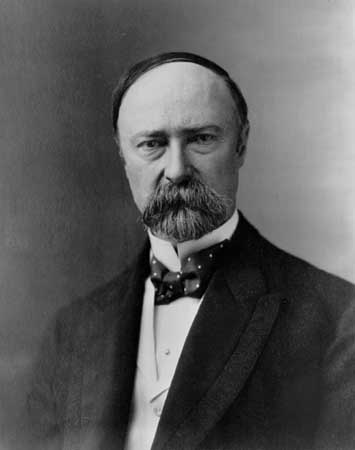Fairbanks, Charles Warren
vice president of United States
born May 11, 1852, Union County, Ohio, U.S.
died June 4, 1918, Indianapolis, Ind.
 26th vice president of the United States (1905–09) in the Republican administration of President Theodore Roosevelt (Roosevelt, Theodore). He was sometimes referred to as “the last of America's log-cabin statesmen.”
26th vice president of the United States (1905–09) in the Republican administration of President Theodore Roosevelt (Roosevelt, Theodore). He was sometimes referred to as “the last of America's log-cabin statesmen.”Fairbanks was the son of Loriston Monroe Fairbanks, a farmer, and Mary Adelaide Smith, who was a strong supporter of abolitionism. Growing up in poverty in a one-room cabin, Fairbanks rose to prominence as an Indiana railway attorney and was the chief power in the state Republican Party from 1896 until his death. In the United States Senate (1897–1905), he was quietly effective and quickly became acknowledged as the principal spokesman for that body.
Fairbanks had considered seeking the presidency in 1900 and was mentioned as a potential running mate to William McKinley (McKinley, William). As a staunch conservative from a “doubtful” state, Fairbanks was chosen as Roosevelt's (Roosevelt, Theodore) running mate in 1904 to balance the ticket. A typical vice president of his time, he did not attend cabinet meetings and was not one of Roosevelt's closest advisers. Although he was nominated by Indiana for president in 1908 and received 40 votes at the Republican National Convention, Roosevelt blocked his nomination in favour of William Howard Taft (Taft, William Howard). When the party was divided in 1912, Fairbanks supported Taft, the eventual nominee, instead of Roosevelt, who ran as the candidate of his own Bull Moose Party. He also ran unsuccessfully for vice president on the 1916 ticket headed by Charles Evans Hughes (Hughes, Charles Evans).
- Gehry, Frank O.
- Geibel, Emanuel
- Geiger, Abraham
- Geiger counter
- Geiger, Hans
- Geiger, Rudolf Oskar Robert Williams
- Geiger, Theodor Julius
- Geijer, Erik Gustaf
- Geikie, Sir Archibald
- Gein, Ed
- Geisel, Ernesto
- Geisel, Theodor Seuss
- geisha
- Geissler, Heinrich
- Geithner, Timothy
- Gejiu
- Ge kiln
- gel
- Gela
- gelada
- Ge languages
- Gelasius II
- Gelasius I, Saint
- gelatin
- gelatin process